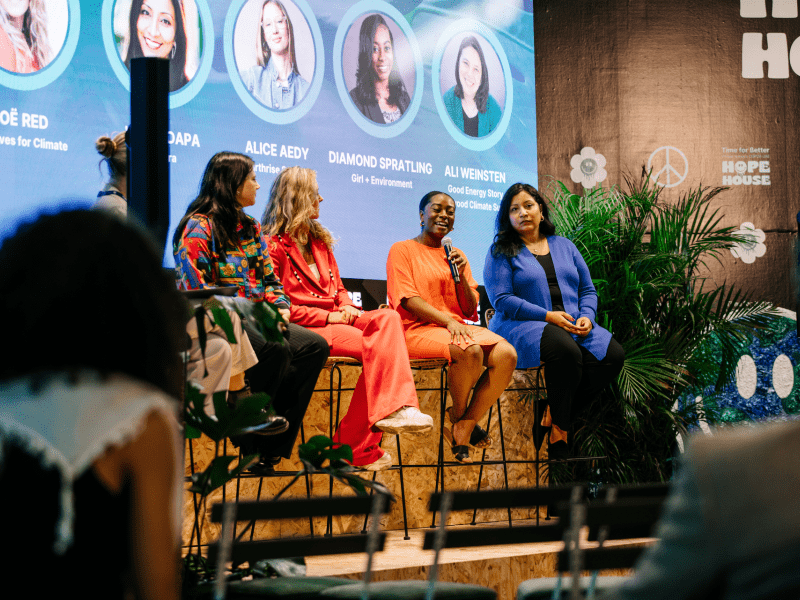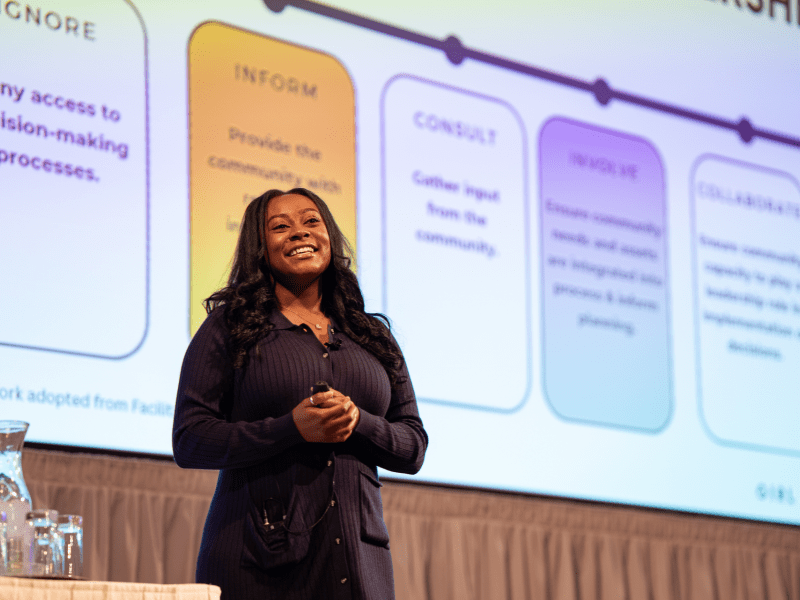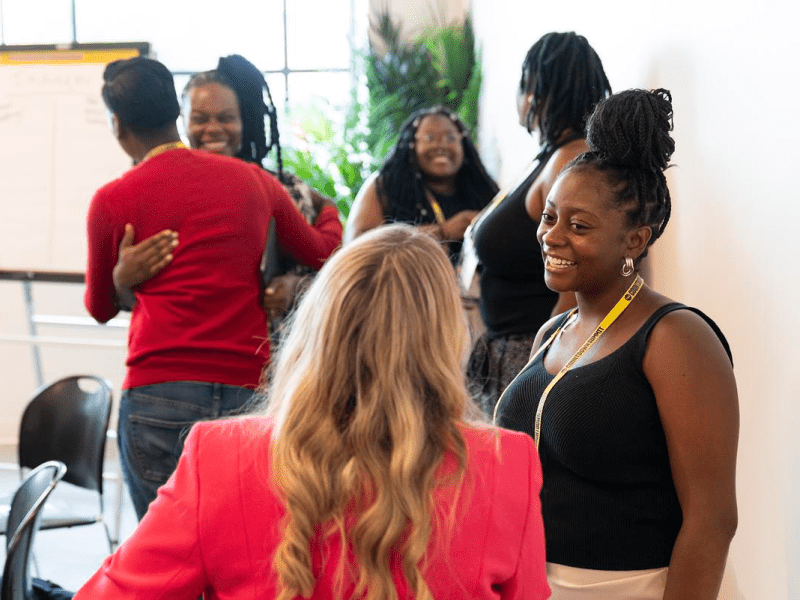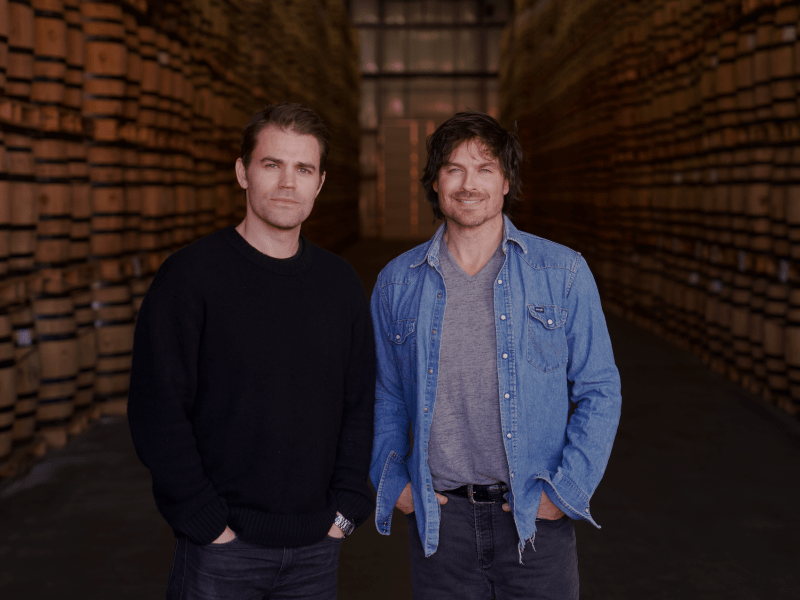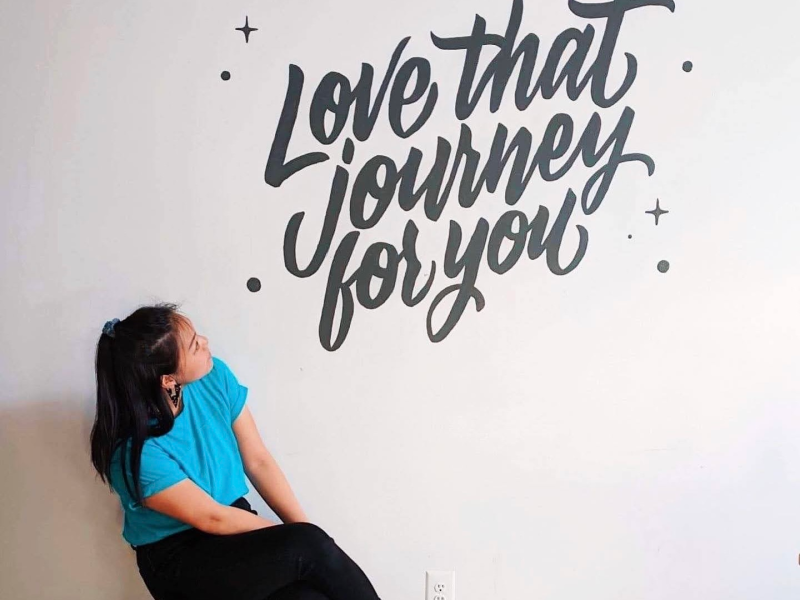Activism in Action: Diamond Spratling Lights the Way for Environmental Justice in Climate and Clean Energy
Climate Week makes its way to the Big Apple, and we’re celebrating by highlighting how one of our trailblazing E2 Fellows advocates for justice in the environmental movement.
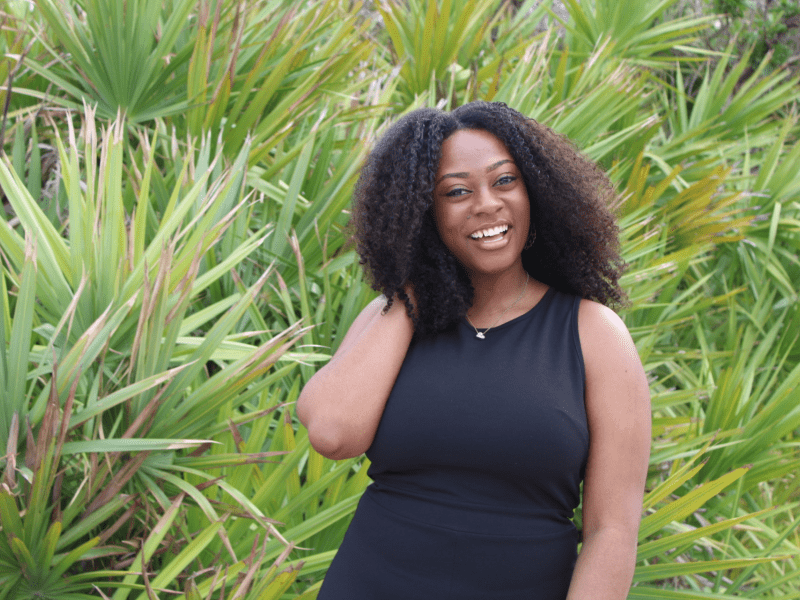
As world leaders, experts, political changemakers, and passionate activists unite to accelerate climate progress during Climate Week NYC from September 22-29, we’re celebrating by spotlighting a very special environmental visionary in our community. Diamond Spratling is an esteemed founder, activist, and speaker in the environmental justice space, and we’re honored to have her as a 2024 E2 Fellow.
In partnership with the NRDC, our E2 Fellowship sponsors young business leaders to pursue various sustainability projects, and Diamond leads an impactful project to develop an educational program for Black women business owners. The six-month program has a goal to help them understand how clean energy can impact their businesses and position them as leaders in the clean energy movement.
Ahead of Climate Week, we spoke with Diamond to explore the experiences that have shaped her journey, the passion and progress surrounding her E2 Fellowship project, the inspiration that drives her to continue to push boundaries, and her advice for young leaders in the environmental justice movement. Diamond also shares the details about her upcoming Climate Week event for Black women in environmentalism and how it will empower them to feel confident, valued, and at-home in the sustainability sector.
Climate Week Chat with Diamond Spratling, E2 Fellow & Environmental Justice Activist
How have your personal experiences shaped the approach you take in your work, particularly in creating equitable solutions for communities of color?
My personal experiences have deeply influenced my approach to climate and environmental justice, particularly in creating actionable solutions for communities of color. Growing up on the west side of Detroit, I witnessed significant environmental racism. As a child, I didn’t fully understand what I was experiencing, but I could sense that certain aspects of my environment weren’t right or fair compared to those of my white counterparts.
My family also endured environmental injustices. My father and many of his siblings worked in the Chrysler automotive plant, like many Black men in Detroit. They were exposed to indoor air pollution, leading to numerous health issues that many of them still battle today. These experiences have made me intentional about addressing the needs of communities of color in my work, ensuring that we are the ones leading environmental conversations, decisions, and solutions. Often, our communities are the most impacted by these issues, so my approach is rooted in meaningful community engagement and framed through a health lens. Health is often overlooked in climate and environmental discussions, but I work to shift the narrative by showing how these issues are not just environmental, but also health, racial, and social justice concerns. This approach resonates with people who look like me, helping them understand the broader implications of environmental justice on our health and well-being.
Your E2 Fellowship program focuses on educating Black women about energy policy. Can you please tell us more about the program?
My E2 Fellowship project is called Blk Grl Businesses in the Clean Economy. This is a fellowship program where we've selected five Black women entrepreneurs based in Atlanta to learn about energy policy at both local and national levels. The program helps them understand how clean energy impacts their businesses, their consumers, and their communities. Most importantly, it equips them to become leaders in the clean energy economy.
We launched this program because we believe there are significant opportunities for businesses to benefit from the clean energy transition, but many Black-owned businesses lack access to the resources, tools, and education needed to take advantage of those opportunities. This fellowship provides our participants with the knowledge to reshape their business models and intentionally engage in the clean energy economy. At the same time, it empowers them to become advocates for clean, affordable energy policies in Georgia, not only for their own growth but also for their communities and consumers.
What are some of the most surprising or impactful findings you've uncovered so far?
One of the most surprising findings so far has been the diversity of applicants who were interested in the fellowship. We had a wide range of business owners apply for the cohort—everything from candle makers and lash technicians to pet supply store owners and tax service providers. It was eye-opening to see that people from such varied industries were eager to learn about clean energy and energy justice.
This was both surprising and inspiring because it instilled hope in the work we’re doing. It showed that clean energy isn't just a niche topic; it resonates across different sectors. I think this highlights the importance of involving everyone in the clean energy transition, and it reinforces the need for us to communicate the intersectionality of energy justice in ways that engage diverse groups. Seeing people who wouldn’t typically apply for a fellowship like this express excitement and interest is a powerful reminder of the importance of accessible, inclusive communication in our work.
Your leadership and commitment to environmental justice have inspired many. As someone who has achieved so much at the intersection of health, environment, and equity, what drives you to continue pushing boundaries and leading these critical conversations?
What drives me to continue pushing boundaries and leading critical conversations around environmental justice stems from my own experiences. Ten years ago, in 2014, when I started undergrad, I was the only Black woman in the environmental policy program at my school. It was an isolating and frustrating experience. Now, I'm focused on creating the organization, the support system, and the community I wish I had when I first entered this space. I believe it's crucial to have people from marginalized communities leading this work because when we are at the forefront, the solutions become more meaningful, equitable, and reflective of the real needs of those most impacted by climate and environmental issues. Though this work is challenging, I feel deeply connected to the movement and responsible for paving the way for women of color across the U.S. and beyond. My goal is not only to help them enter the environmental sector but to ensure they feel supported and confident in standing up for safe healthy environments for themselves and their communities.
As you prepare for NY Climate Week, what are some of the key topics or issues you plan to address at the event you’re hosting on behalf of Girl Plus Environment?
Girl Plus Environment is excited to host an intimate dinner for Black women in climate during New York Climate Week, bringing together women from various generations and sectors. We’re thrilled to collaborate with Spelman College to create a safe, welcoming space for meaningful conversations and connection. Our goal is to facilitate discussions where Black women can share their experiences, offer advice, exchange resources, and build long-term friendships, fostering a sense of community and support.
We also aim to emphasize the importance of self-care within the climate movement. As members of marginalized communities, we are often the most impacted by climate change, and while we fight for others, it’s essential to also care for ourselves. I hope this dinner allows space for conversations about how we can nurture our well-being as we continue the fight for climate justice. Lastly, we aim for solutions-based discussions, focusing on collaboration and support across organizations and industries. It’s critical to leave this space not only with shared stories but with concrete action items and opportunities to create meaningful change together.
How do you hope this event will impact attendees and the broader community?
I hope this event serves as a safe and empowering space for Black women in the climate sector, whether they are just starting out or have been in the field for over a decade. Often, during major events like New York Climate Week, SF Climate Week, or COP28, it can feel isolating—especially for women of color. My hope is that attendees leave feeling a strong sense of community and support from others who look like them and that they can form meaningful, lasting relationships beyond this event. Additionally, I hope the conversations help attendees gain more confidence in their roles, especially when they find themselves in spaces where few people look like them. My goal is for everyone to leave this event feeling more empowered, knowing they belong in this sector and that their contributions are incredibly valuable.
You’ve received numerous accolades for your work in environmental justice. What advice would you give to other young leaders looking to make a similar impact in their communities?
One of my favorite pieces of advice to share with young leaders is a quote that has guided me: “Do something today that your future self will thank you for tomorrow.” This has been my life motto and has kept me going, not only in the environmental justice movement but in other aspects of life as well. It's easy to get caught up in the challenges and lose sight of the impact you're making, so I encourage them to remember that their efforts today will create lasting change, even if it's not immediately visible.
Another key piece of advice is to prioritize mental health. You cannot pour into your community, the climate movement, or anywhere else if you're mentally exhausted. It's essential to take care of yourself first to continue making an impact. Self-care and well-being are just as important as the work we do, and I believe that mental health should be a top priority in the environmental justice movement.
